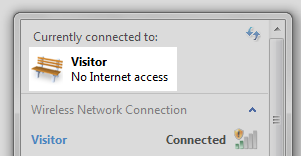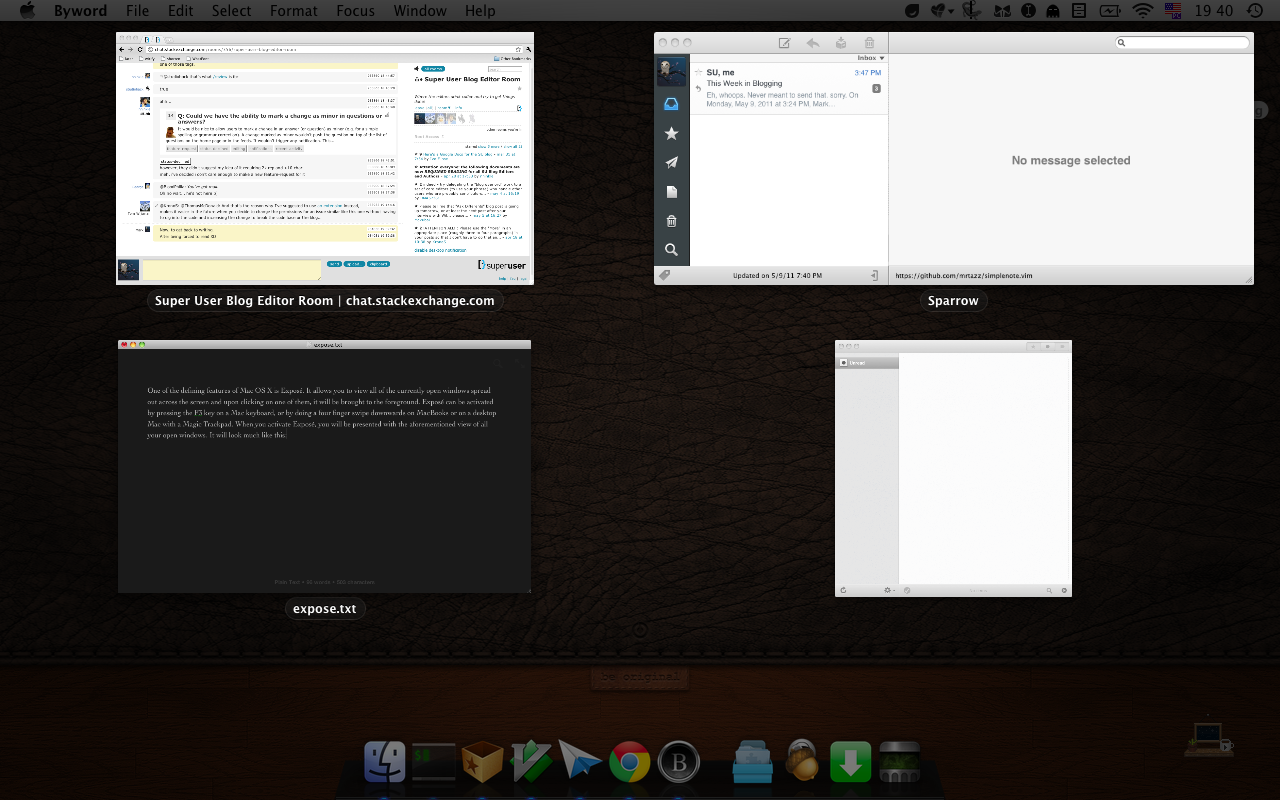Archive for May, 2011
Ask Different Podcast #3: iMac upgrades, Spotlight tips, Tiny Wings
This is the third episode of the Ask Different Podcast, an unofficial podcast created by members of the Ask Different community about Apple and related technologies.
Your hosts this week are Kyle Cronin, Jason Salaz, and Nathan Greenstein.
- Kyle begins with some news about this podcast: We’ve launched! We want to thank everyone that has sent us feedback, we appreciate it. Also, we’re now featured on the Super User Blog.
- Nathan describes Stack Exchange’s recent efforts to boost voting on questions, especially relative to answers. Verdict: if you see a great question on Ask Different, vote it up!
- Jason discusses LastPass’ recent possible security breach, what this means, how LastPass is responding, and what users of the service should do as a result. Jason also brings us a correction to a previous episode regarding which features are available in the free vs paid plans.
- Nathan updates us with hard data about the white iPhone 4’s alleged width gain, and discusses whether or not the color of the actually makes a difference.
- Kyle delivers an iPhone tracking update: Official iOS update released. What it changes, and how it helps you stay more secure. Jason discusses Apple’s impressive response to the tracking issue.
- We discuss the fact that, while Android phones are more popular than the iPhone, the iPad is much more popular than the slew of available Android tablets. Do Android and iOS tablet customers expect different things from their tablets? Are the iPad’s main advantages timing and price?
- Nathan takes us through the recent upgrades to the iMac line, we discuss if it’s worth getting the 21-inch model, and whether or not the two Thunderbolt ports on the 27-inch model eliminate most of the need for a Mac Pro.
- Kyle compares how (relatively) easy it is to service the newer iMacs compared with the older iMac G3 and iMac G4.
- We share some tips on how to get Spotlight to work for you, including excluding certain directories and search paramaters (pdf) based on the file metadata.
- Our Question of the Week was asked by Carlos: Snow Leopard Server as main (everyday) OS, and we discuss whether it’s a good idea to run desktop apps on a server.
- Our App of the Week is Tiny Wings, a game for iPhone and iPad where you play as a bird and try to fly as far as you can before the sun sets. Tiny Wings is available on the App Store.
This episode was recorded on Saturday, May 7th. You can subscribe to this podcast via RSS or iTunes. If you have any feedback or questions you’d like for us to answer on air, leave a comment on this post or e-mail us at podcast@askdifferent.net.
Getting the Most Out Of Mac OS X’s Exposé
One of the defining features of Mac OS X is Exposé. It allows you to view all of the currently open windows as an overview spread out across the screen. Exposé can be activated by pressing the F3 key on a Mac keyboard, or by doing a four finger swipe downwards on a Mac trackpad. When you activate Exposé, you will be presented with the aforementioned view of all your open windows. It will look much like this:
If you click on one of the windows, it will be brought to the foreground.
This seems pretty simple, right? It is, but there are many things that you can do to make Exposé easier to use. For instance, Apple added a feature in Snow Leopard called Dock Exposé. With Dock Exposé, you can view all the windows of just one application. It can actually be activated in multiple ways. The most common way is to click and hold on an icon in the dock for about a second. This will display very similarly to the regular Exposé view except for the fact that it is only showing the windows for the application whose icon you clicked on in the dock.
Windows 7 Network Awareness: How Windows knows it has an internet connection
Have you ever been connecting to a new wireless network and seen the following pop-up balloon?

 Whenever I connect to a WiFi network which requires in-browser authentication, such as university networks and hotel access points, Windows somehow magically knows. Windows also knows when your internet connection isn’t working, and can differentiate between having local LAN access, no network access at all, or full internet access. But how?
Whenever I connect to a WiFi network which requires in-browser authentication, such as university networks and hotel access points, Windows somehow magically knows. Windows also knows when your internet connection isn’t working, and can differentiate between having local LAN access, no network access at all, or full internet access. But how?
This week’s question of the week is one I myself asked about this very topic. I guessed that there must be some online Microsoft site that Windows is checking to determine the state of the connection, but I wanted proof, not just speculation.
Migrating to Linux from Windows
Ask someone what operating system they’re using, and chances are they’ll reply with some version of Windows. It’s hard to find a PC for sale anywhere that doesn’t have some version of Windows pre-installed on it. However, with recent privacy and security threats, Windows has taken a lot of heat for vulnerabilities found within the operating system. For that reason and perhaps others, many are beginning to look at alternatives. One such alternative is Linux.
The decision to migrate to Linux might be based on a number of factors such as performance, security, or stability. Linux is widely known for its robust kernel and raw speed. Many web servers run Linux – in fact, according to Wikipedia, the majority of websites are powered by Linux. Despite its huge presence in the server market though, it does not enjoy the same widespread usage on typical desktop computers – probably the two biggest reasons for that are education and compatibility.
A lot of people are surprised to find out that the same software they use on Windows is either available for Linux or a program with equivalent functionality can be used. In some cases, it is even possible to run Windows applications in Linux using a compatibility layer (such as Wine or Mono). In order to understand Linux a little better, we’ll take a look at its history.
Ask Different Podcast #2: RIM Playbook, Continuous Client, Coda
This is the second episode of the Ask Different Podcast, an unofficial podcast created by members of the Ask Different community about Apple and related technologies.
Your hosts for this episode once again are Kyle Cronin, Jason Salaz, and Nathan Greenstein.
- Jason and Kyle begin with news of Stack Exchange’s improved tag sets filters tool, which makes it easier to view your combined profile and follow subjects that interest you across the entire Stack Exchange network.
- Newly-released white iPhone 4: Thicker? We discuss the (late) release of the white iPhone 4 and the girth it’s apparently gained.
- Jason shares his experience using RIM’s BlackBerry Playbook tablet. It’s effective, and it fits in, but is it enough?
- More iPhone tracking! We discuss what’s recently come to light about the Great iPhone Tracking Scandal, including Apple’s official press release and the action it promises.
- Apple’s claim: It isn’t tracking!
- An upcoming software update will reduce size of location database, and stop syncing it to computers.
- Jason and Kyle discuss Marco Arment’s experience with having free and paid versions of the Instapaper app on the iOS App Store, and share their own views about free vs. paid apps.
- Nathan brings news of the new, controversial AirPush advertising service for Android. We share our views on what is and isn’t acceptable in mobile advertising and in-app purchasing.
- Kyle shares his support for the idea of a Continuous Client, a mechanism to let you pick up on one device exactly where you left off on another one. We share our experiences with various products’ and services’ good and bad support for this concept.
- Our App of the Week is Coda, one window web development, by Panic. Coda is available on the Mac App Store, and a trial version can be downloaded from Panic’s site.
This episode was recorded on Saturday, April 30th. You can subscribe to this podcast via RSS or iTunes. If you have any feedback or questions you’d like for us to answer on air, leave a comment on this post or e-mail us at podcast@askdifferent.net.
Putting an Apple back on the tree
Ladies and gentlemen, a round of applause and a warm welcome for our first WTFriday post/column! WTFriday is a brand new section that should produce an awesome post for The Super User Blog every single friday! WTFriday is about everything, it’s about (good or bad) experiences, it’s about frustrations, rants and praises, it’s about you and most of all it’s about the “fun” side of computer stuff! This week’s contribution has been written by nobody less than Mark (Mark Szymanski) and I hope conveys an important lesson. Enjoy reading it!
So, what could YOU do for WTFriday?
Below is the contribution for this week, next week there will be another one of you guys talking about something they did! If you’re eager to write about something you’ve experienced or if you’ve been working on an awesome project (We’ve got one in store for you! It involves a CPU and the apocalypse! Keep checking the blog for more!) contact me through this meta post or e-mail. My e-mail address be “Bloodphilia at gmail dot com“.
-BloodPhilia

A little while ago, I had quite the “fun” experience with my computer. I had decided to put Ubuntu on a USB flash drive. I didn’t have a PC to do this with, so I settled for my MacBook. I booted to the Ubuntu install disk and installed it on the flash drive. Everything was just fine and dandy at this point. Then there is the task of restarting my MacBook so it can boot back into OS X. The thing is, Mac OS X wouldn’t boot. At all. All I got was the flashing folder with the question mark in it. As it turns out, since I was installing this onto a USB drive, I should’ve installed the bootloader onto that drive. I didn’t do that, and instead installed the bootloader onto my Mac’s hard drive. So now my Mac can’t see its bootloader because it has been replaced with GRUB.
A first look at Soluto: Elegant anti-frustration software.
Soluto bills itself as “anti-frustration software.” At the moment it is simply a rather elegant Windows start-up program manager, but what sets it apart is that simple elegance and the wealth of information and options that it gives to the user. There is also an intriguing peek at the future of Soluto in their PC Genome Project.
The Soluto website itself is pretty minimalistic, giving you only as much information as you need; a “download” link, an quick video description, and a couple of recommendations from users are all that grace the page past the obligatory logo and title bar style navigation buttons.
Meet Ivo… ♦ Super User Mod ♦
This weeks interview is a little bit different from all others… this time we interview the interviewer! Ivo Flipse has been with Super User since its creation and is one of its ♦ Mods. Besides Diago, he and Troggy are Super User’s most experienced Mods. Ivo hails from the Netherlands, and is currently working on a PAWS program which we’ll talk about later. ![]() Here is his story:
Here is his story:
Maximizing the lifetime of your SSD
An SSD drive is a precious investment
An SSD drive is a precious investment, you don’t want your SSD to fail, do you?
So it is interesting to try to do things to increase it’s lifetime and see if it’s worth it. This is exactly what one of our fellow Super Users was planning to do, this user called caveman asked
How to prevent programs from killing my SSD in two weeks?
I just got my first SSD. And I have SSDLife monitoring in the background. After I have installed all software, and did some basic testings. SSDLife said “Total Data written, GB” = 52.1 (40GB used space, 70GB free space).
So, he only installed about 40 GB of data but there is already 52.1 GB written?
He found why this happens in a post which explains:
The problem with an SSD is, data is written in blocks. A block may be 256KB: 256 * 1000 * 8 binary digits. To change even ONE of these digits, you must rewrite the ENTIRE block. That is to say, your OS sees 1 bit being written, but the SSD wear is equivalent to 256KB being written: a 2.048 MILLION fold difference.
Which means that the formula
(SIZE OF SSD) * (Endurance Cycles) = Total data written to SSD before failure
is only for the best case scenario which would allow you to write 1,000 to 1,000,000 times the data of the drive before failure. But, looking at the average to even worst case, those are way more likely to occur with all those small writes going on on the SSD. This is confirmed in
What is the lifespan of an SSD drive?
However, the gist is that SSDs are more reliable than hard disks, and should last a good 20 years at least not counting performance degradation. — Answer by caliban
And that is what we could call an average case. You can do the numbers for the worst case if you want to, I can assure you that it doesn’t look good!
Let’s maximize the lifetime of our precious SSD by wear leveling and minimizing all those small writes to it, using simple and advanced techniques…
Where did all my hard drive space go? Part 3
This is the third part of a three part article, for parts two and three go to Part 1 and Part 2
Continuing our journey into the world of missing hard drive space I hope to impress on you one of the worst offenders for making your hard drive space disappear:
Programs Themselves
One of the absolute major problems cruft building up on your computer is using the programs you install.
Everything from Internet Explorer to Google Earth to Picasa, each and every one of them wants to be fast at what they do and every one of them uses your disk space to store their temporary files.
Some of these programs are quite careful and elegant about how much space they use, keeping only what they immediately need for speed on your disk or deleting everything over a certain amount.
Other programs, well, don’t. Other programs store every last piece of data they got their grubby mits on. I’m looking at you Google Chrome, you and your ever increasing and seemingly unlimited disk cache. I don’t care if I have a huge hard drive and you think allocating $SOMERANDOMNUMBER percent of it for your cache is acceptable, you can dang well work to a limit like every other sane piece of software. (note: when I wrote this my Chrome cache was sitting pretty at 1.5GiB and showing no signs of remorse for its actions)


